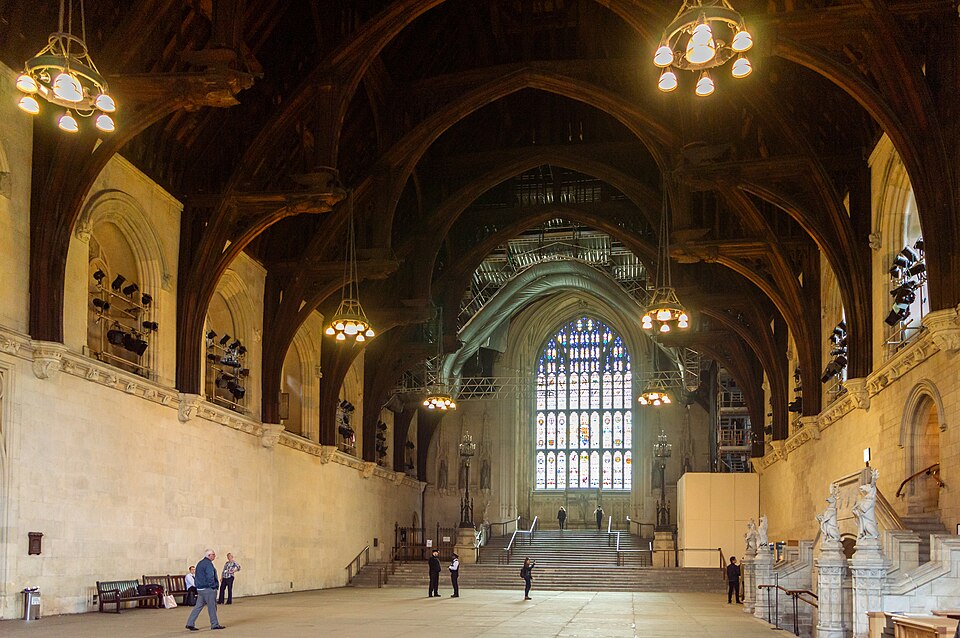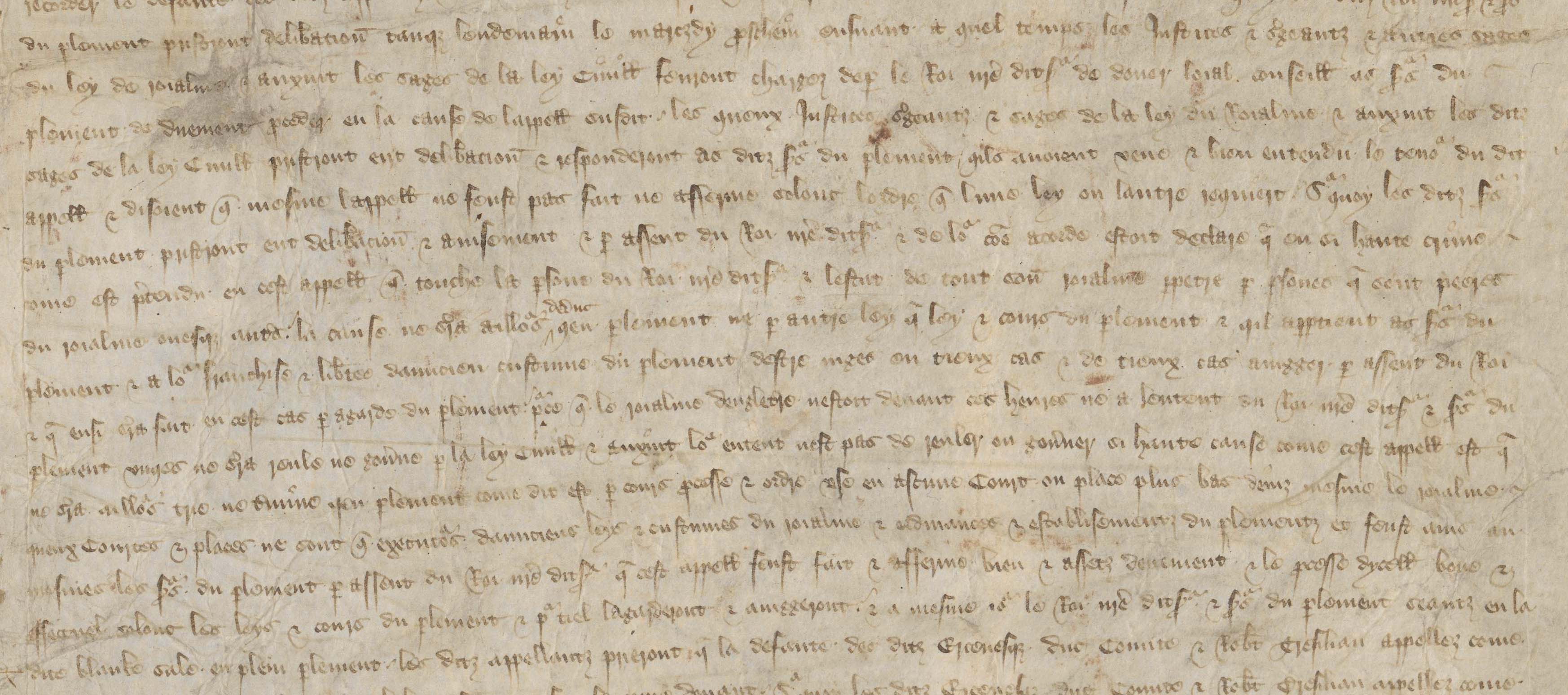OCR Specification focus:
‘the Wonderful Parliament and the impeachment of Chancellor Pole (1386); the Lords Appellant and their rule; the Merciless Parliament (1388)’
Richard II’s personal rule faced its first major constitutional and political challenges in the 1380s, marked by the extraordinary sessions of the Wonderful Parliament and the Merciless Parliament. These episodes revealed the growing tension between the young king and sections of the nobility, and they shaped the balance of power in England during the late 14th century.
The Wonderful Parliament of 1386
In 1386, the king’s Chancellor, Michael de la Pole, Earl of Suffolk, became the focus of widespread discontent. The financial burden of ongoing war with France, allegations of mismanagement, and resentment over royal favourites prompted Parliament to act decisively.
Parliament demanded de la Pole’s dismissal and impeachment.

Interior of Westminster Hall, where late-medieval Parliaments met. The celebrated hammerbeam roof dates from the 1390s, slightly after 1386–88, but the hall’s function and scale reflect the parliamentary environment of Richard II’s reign. This broader architectural detail exceeds the syllabus’ strict scope but clarifies the physical context of proceedings. Source
Richard II initially resisted but was forced to accept Parliament’s authority, marking a significant assertion of parliamentary influence over royal governance.
This was the first recorded impeachment in English history, setting an important constitutional precedent.
Impeachment: A formal process by which Parliament accused royal ministers of misconduct, demanding their removal from office.
The Wonderful Parliament also sought to restrain the king’s autonomy. A commission of fourteen nobles and bishops was appointed to oversee royal finances and government for a year. This demonstrated Parliament’s determination to limit Richard’s personal control.
Royal Resistance and Escalating Conflict
Richard II, deeply affronted by what he viewed as an infringement upon his divinely ordained kingship, responded with hostility. He questioned Parliament’s authority and sought legal opinions on whether their actions were treasonous. This tension revealed the king’s belief in sacral monarchy, the conviction that his authority was sanctioned directly by God and could not be curtailed by earthly institutions.
Richard’s attempts to reassert power included cultivating loyal courtiers such as Robert de Vere, Duke of Ireland.
His estrangement from traditional magnates, notably the Duke of Gloucester (his uncle), created the conditions for factional strife.
The Lords Appellant and the Road to 1388
By 1387, discontented nobles formed an alliance against the king’s favourites. Known as the Lords Appellant, they included Gloucester, the Earls of Arundel, Warwick, Nottingham, and Derby (later Henry Bolingbroke).
Lords Appellant: A group of powerful nobles who ‘appealed’ (accused) Richard II’s advisers of treason, claiming to defend the realm from misgovernment.
Key developments leading to confrontation:
Battle of Radcot Bridge (December 1387): The Lords Appellant’s forces defeated de Vere, undermining the king’s military backing.

Illuminated miniature (c. 1475) from Froissart’s Chroniques showing Robert de Vere escaping by boat after Radcot Bridge. As a later artistic depiction from a continental manuscript, it adds narrative colour beyond the syllabus but accurately represents the episode that precipitated the Merciless Parliament. Gallica’s viewer provides a high-resolution scan suitable for close study. Source
Richard was compelled to surrender his favourites for trial, further diminishing his authority.
The Merciless Parliament of 1388
The Merciless Parliament, convened in February 1388, represented the triumph of the Lords Appellant over the king’s inner circle. It became infamous for the harsh measures imposed against Richard’s supporters.
Leading royal favourites, including de Vere and de la Pole, were declared traitors. Many were executed or exiled.
The Parliament earned its name from the severity of punishments, reflecting the determination of the Lords Appellant to eradicate Richard’s influence.
The governance of England effectively passed into the hands of the Lords Appellant during this period.
The use of parliamentary judicial procedures to legitimise these actions highlighted the evolving political role of Parliament, not just as a legislative body but as a forum for prosecuting treason and regulating power.

Parliament Roll entry (series C 65/48, article 14) asserting Parliament’s authority to hear appeals of treason in 1388. The hand, layout and margins illustrate late-medieval record-keeping for parliamentary justice. This source includes legal language beyond the syllabus focus but precisely evidences the Merciless Parliament’s procedure. Source
Constitutional and Political Significance
The Wonderful and Merciless Parliaments highlighted critical issues in late medieval English politics:
Royal authority vs. parliamentary oversight: The events revealed that Parliament could challenge and even constrain the king when supported by powerful magnates.
Precedent for impeachment: De la Pole’s case established that royal ministers could be held accountable by Parliament, a precedent with lasting constitutional impact.
Factionalism and instability: Richard’s reliance on favourites and the hostility of senior nobles created a deeply fractured political environment.
The Limits of Appellant Rule
Although victorious in 1388, the Lords Appellant’s governance proved unstable. They were united more by opposition to Richard’s favourites than by a coherent political programme. Their dominance alienated sections of the political community and could not permanently exclude the king from power.
By 1389, Richard II regained control, asserting his personal rule once again.
The experience of the Wonderful and Merciless Parliaments, however, remained a cautionary memory, shaping Richard’s later desire to eliminate noble opposition altogether.
Wider Implications for Richard II’s Reign
These parliaments foreshadowed Richard’s later struggles and ultimate deposition:
The memory of parliamentary intervention remained a check on Richard’s authority.
His growing sense of personal betrayal by the nobility contributed to his later authoritarian measures, including the purge of 1397.
The events underscored the fragile balance between monarchy, nobility, and Parliament in late 14th-century England.
In sum, the Wonderful Parliament (1386) marked a turning point in parliamentary assertion of authority, while the Merciless Parliament (1388) demonstrated the extremes to which noble opposition could go in curbing royal power. Together, they illustrate the turbulence and political experimentation of Richard II’s early rule.
FAQ
The term “Wonderful” reflected the shock contemporaries felt at Parliament’s boldness in confronting royal power. It was extraordinary for Parliament to force the dismissal of a royal minister and to appoint a commission that effectively limited the king’s autonomy. The title suggests the event was seen as remarkable, both for its audacity and its rarity in English political tradition.
Michael de la Pole lost his position as Chancellor and his influence at court collapsed. Although he was not executed, his disgrace symbolised the vulnerability of royal favourites to parliamentary attack. His downfall also warned other courtiers that alignment with the king carried risks when Parliament and senior nobles united in opposition.
The Lords Appellant argued they were defending the realm against corruption and misrule. They claimed that Richard’s advisers:
Misused royal finances.
Encouraged poor foreign policy decisions.
Undermined the kingdom’s security.
By framing their opposition as a defence of England, they positioned themselves as loyal subjects rather than rebels against the crown.
The defeat of Robert de Vere at Radcot Bridge destroyed Richard’s military credibility. With his chief supporter routed, Richard lacked the force to defend his favourites.
This humiliation left him politically isolated and gave the Lords Appellant the confidence to summon the Merciless Parliament, where they imposed their will with little resistance.
The executions and exiles of his close companions left Richard embittered and vengeful. He felt betrayed by the nobility and humiliated by Parliament’s intervention.
This personal anger shaped his later policies. When Richard regained power in 1389, he remembered the affronts of 1386–1388 and sought to eliminate his opponents permanently, setting the stage for his later tyranny.
Practice Questions
Question 1 (2 marks)
Who were the Lords Appellant and what was their role in the Merciless Parliament of 1388?
Mark scheme:
1 mark for identifying that the Lords Appellant were a group of powerful nobles who opposed Richard II’s favourites.
1 mark for stating their role in prosecuting the king’s ministers for treason during the Merciless Parliament.
Question 2 (6 marks)
Explain how the Wonderful Parliament of 1386 and the Merciless Parliament of 1388 challenged Richard II’s authority.
Mark scheme:
1 mark for noting that in 1386, Parliament impeached Michael de la Pole, the king’s Chancellor.
1 mark for recognising that this was the first use of impeachment, limiting royal choice of ministers.
1 mark for stating that Parliament appointed a commission of nobles and bishops to oversee governance, restricting Richard’s independence.
1 mark for identifying that in 1388 the Lords Appellant used the Merciless Parliament to try and punish Richard’s favourites.
1 mark for explaining that this demonstrated Parliament’s ability to act as a court, undermining Richard’s personal control.
1 mark for explaining the severity of punishments (executions and exiles), which showed the king’s inability to protect his supporters.

